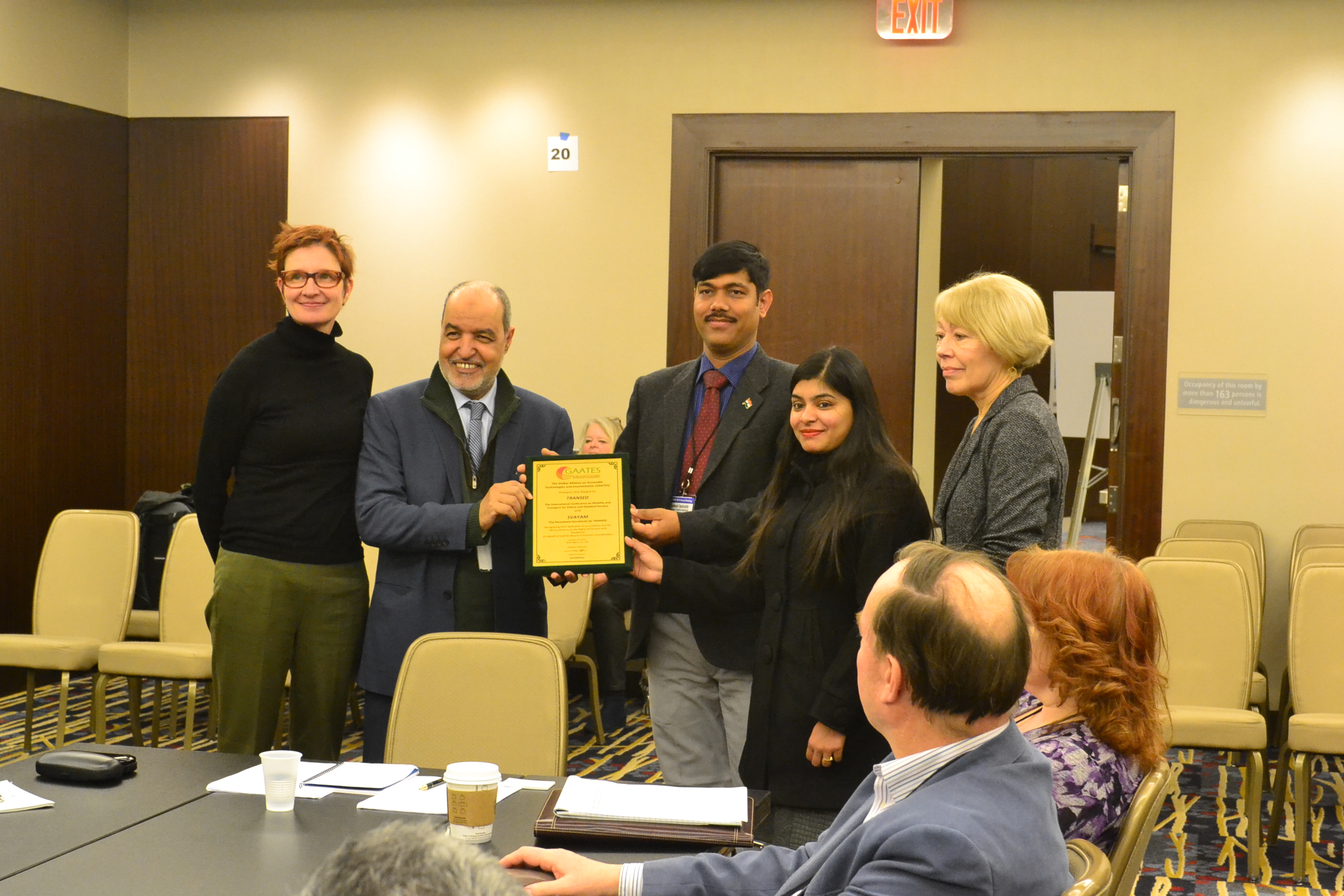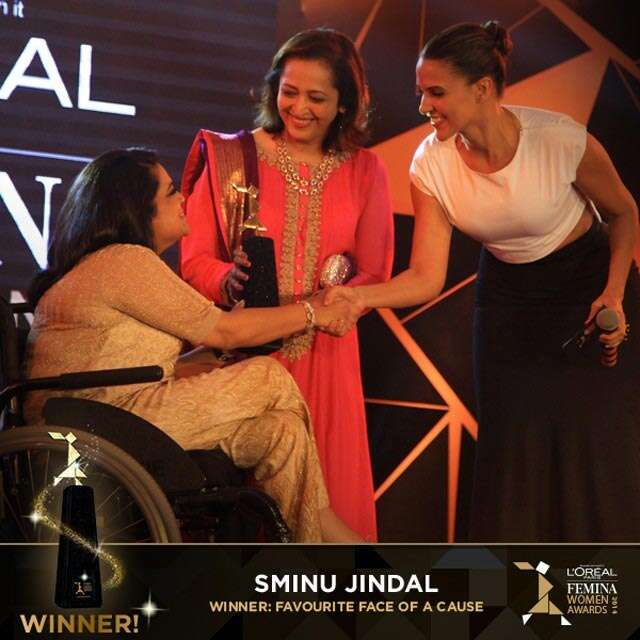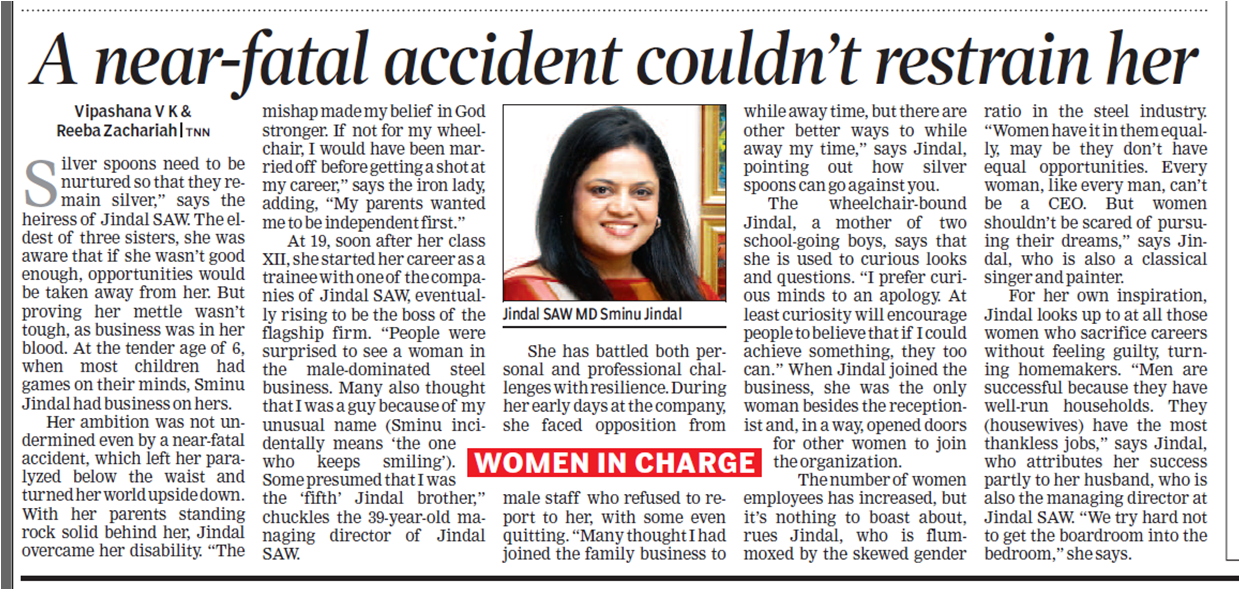How Sminu Jindal’s Svayam is bringing mobility to those on wheel chairs
MARCH 7, 2016 BY POORVI GUPTA
She is trying to make the country accessible for disabled people. She is collaborating with the government and changing the infrastructure to bring the differently-abled out of their homes. Dynamic, strong, Director of one of India’s most important industries and a paraplegic, meet Sminu Jindal. A bad accident at 11 changed her life. Sminu was a good kathak dancer before that, but she did not let her spirit down and studied hard to get into her family business and finally excel at that.
Once, she became a successful entrepreneur, Sminu realised that there are so many like her with probably fewer facilities who are not able to enjoy their basic rights. And hence was born, Svayam, her dream to see every disable person treated no less than any other human being.
Sminu’s initiative has already been well-received and recognised by the general public. Through her initiative, she has made some historical monuments like the Qutub Minar and the Jallianwala Bagh, disabled-friendly, which are great achievements. Here is a detailed interview that Poorvi Gupta had the pleasure to do and learn from the very gracious, Sminu Jindal :-
Q. What led you to start Svayam and what’s the mission behind it?
Basically being on a wheel chair, I realised that the infrastructure and moving about on a daily basis is not easy. And yet, I realised that a larger chunk of population was also affected by inaccessibility like pregnant women, children with broken bones. Age is another factor that none of us can escape. We are now living in multi-floored buildings; Delhi is no more a city with single-floored houses. All these things led me to believe that we need to work on accessibility and we must have something that makes general masses aware of what is available to them by the government also in terms of benefits.
It is very important to have government support in this. We can’t do everything ourselves.
So we started with a dip check in the form of a portal that gave information and we came across a very positive response. So why is it that we don’t see such people out on the streets or out on work? We finally came to the conclusion that infrastructure along with public transport system were so in accessible that these people were locked up in rooms. And that’s when we started working very actively contributing to the growth.
How Sminu Jindal’s Svayam is bringing mobility to those on wheel chairs.
Svayam works to empower people with reduced mobility by helping to change infrastructure and bringing in more policy awareness on the part of government. We realised that if we don’t walk together with the government then there is very little one person can do alone. We are only a catalyst and we think we are successful at that.
What was the turning point – how did the accident transform your approach to life?
While growing up, I met with an accident when I was really young at 11 years of age. So I faced a lot of difficulties, but I also realised that it was made a lot easier because of my social standing. Not everybody has that kind of benefit and backing not only in terms of money but also in terms of positive people around them. So what does that person do? How does that person lead a normal life? How do we tell those people who have met some unfortunate situation like an accident or an act of war etc instead of sympathising with them? All these questions have always motivated me to do something constructive so this is what I did.
Q. What kind of challenges apart from physical ones have you faced and how have you dealt with them?
This question always flummoxes me because you also face challenges when you wake up in the morning and for you, you don’t know the life any different. Somebody might say about a very rich person that ‘oh you don’t have any challenges’. But each one of us has our own challenges and it’s equally difficult for each one of us.I took my challenges in my stride and each one at a time.
I also went through self-denial that one day I would be able to walk. I also felt pitiful about me and wanted to sit at home and cry. The regular that each one of us go through in terms of an emotional roller-coaster when we meet something that changes our life. Yet every day I wake up and say it’s a new day, it’s a new beginning so I am going to make the most of it. And this has kept me going.
I took my challenges in my stride and each one at a time.
Q. You are also a strong entrepreneur and a woman who has broken cultural barriers in the steel, oil and gas industry. How difficult was it for you?
It is always difficult for a woman to enter the macho industry of steel, oil and gas. But then there is this wise friend of mine who says, that ultimately it is the knowledge that is appreciated and I guess that’s what happened with me. I did go through a transformation from childhood to now when earlier; I had always run around in these offices at a young age to now when I became the boss. All that aside, it’s very easy for people to say that people from business families have it easy, it is only so up to a certain level. But to get respect of everyone, I think education, information and wisdom finally works.
Q. It is said that you if you are from a family that has a certain social standing then there is a lot of pressure on you and if you’re a woman then it’s even more. Is it true?
Of course, being from a business background I grew up with leaders around me. But then it is also true that being a woman I did go through a lot of trouble. You have to be wiser and you have to be able to juggle because you have to be a mom, a good daughter-in-law, a wife. So there are many hats that you don. So I think being a woman teaches you a lot. It is god’s way of telling you that you have finally arrived.
Q. Tell us about the entrepreneurial skills that have moved you towards success?
As I said, I have grown amongst leaders so I guess I have learnt to take risks in my stride. To not get swayed by too much criticism or too much praise. Be able to maintain the equilibrium in my head. That’s a very important point, if you don’t stay rooted to your ground, you cannot go much higher.
Being humble is one thing I have believed in, in terms of my entrepreneurial skill.
Q. One achievement that has made you very proud.
Imagine something that I started way back in 2000, finally I have a Prime Minister who echoes the same sentiment. I think that itself is something that makes me feel wow today. It makes me feel that finally the people who were given upon for not being able to contribute can actually now be empowered. And I think there is no reason for each one of us to cry about the problems that we have. Because, now we will have accessible country.
I think being a woman teaches you a lot. It is god’s way of telling you that you have finally arrived.
Q. What is that societal change you are looking for in terms of it becoming more inclusive of disabled people?
I would really like people to give up sympathy and adopt empathy. Don’t look at disabled people as people who need help, empower and allow them to do things themselves. Give them the sense of respect and dignity for them to do things on their own without patronising them. Of course, if a person is falling, your first reaction should be to help that person, but if that person says, “I can take care of it,” then allow that person to do so.
Q. Advise for people with special needs.
I would look at a person who has fewer opportunities, yet it is within us to make choices. Happiness is a choice. It is not an end result to a sum of circumstances. If that was so, nobody would find happiness. I am happy because I decide to be happy, not because the circumstances lead me to be happy. I urge people to look at the positive side of life because seeing the negatives anyway we won’t thrive, so might as well do the opposite and see possibly we can make it. So even in the most dismayed circumstances, I have seen people with most difficult situations and still a smile on their face, I think that’s the biggest quality.
Source: See the People





